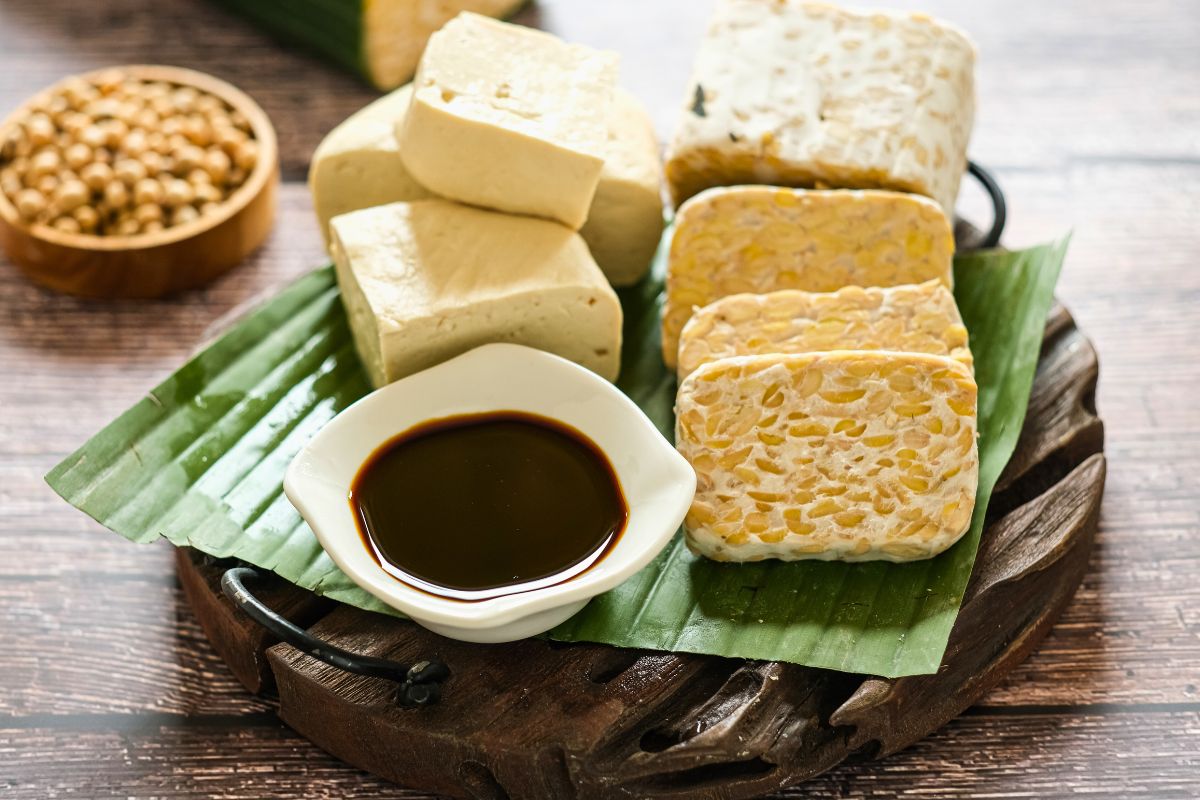Tempeh vs Tofu Showdown: A Food Lover’s Protein Dilemma

So, you’ve decided to cut down on meat. That’s an excellent decision. But now you’re standing in the supermarket, staring at two very similar-looking blocks in the chilled section: tempeh vs tofu. One says tempeh. The other says tofu. Both come from soybeans. Both promise loads of protein. So what’s the actual difference?
Don’t worry. We’re going to sort this out properly.
Table of Contents
ToggleWhat Exactly Are These Things?
Let’s start with tofu. It’s just solidified soy milk. It’s kind of like cheese-making, but with soybeans rather than cow’s milk. The soybeans are soaked, crushed, and boiled. The milk is then separated from the pulp and formed into that familiar white block.
Tempeh is completely different. It begins with whole soybeans, which are fermented with a special mould, rhizopus oligosporus. This fermenting action glues all the components together into a hard, nutty cake. You can see the beans in tempeh; it’s a lumpy, bumpy mass that looks something like a granola bar made out of soybeans.
The Numbers Game: Tempeh vs Tofu Nutrition Facts
Here’s where things get interesting. Per 100 grams, tempeh has roughly 19 grams of protein versus tofu, which has not even half of that (8 grams per 100 g). That’s a massive difference.
But in other categories, tofu fights back. Tempeh is high in prebiotics and has a lot more protein and fibre, whereas tofu has more calcium. So if you’re concerned about bone health, tofu could be your friend.
Let’s break down what you get in a typical 100 g serving:
Tempeh Nutrition Facts
- About 160 calories
- 19 grams of protein
- 4.5 grams of fat
- Loads of fibre
- B vitamins (especially B12)
- Magnesium and phosphorus
Tofu Nutrition Facts
- Around 120 calories
- 8 grams of protein
- 6 grams of fat
- Lots of calcium
- Iron and potassium
- Isoflavones
Tempeh has more calories, protein, and fibre, while tofu is lower in calories and carbohydrates per gram, and neither has sugar
Taste And Texture: The Real Test
This is where your personal preference really matters. Tofu tastes like… well, not much really. It’s famously bland, which actually makes it brilliant for soaking up whatever flavours you throw at it. Curry? It’ll taste like curry. Teriyaki sauce? Perfect teriyaki tofu.
Tempeh has a proper personality. It’s nutty, earthy, and slightly tangy because of that fermentation process. Some people love it straightaway. Others need time to warm up to it.
Texture-wise, tofu can be silky soft or properly firm, depending on which type you buy. Tempeh is always firm and a bit crumbly, which is perfect for slicing and grilling.
Cooking: What Works Best?
Tofu is ridiculously versatile. You can scramble it for breakfast, make it into smoothies, crumble it into bolognese or cube it for stir-fries. The softer ones are perfect for desserts and sauces. Good, firm tofu is a champ on the grill or in a frying pan.
Tempeh loves high heat. Cut it into slices and pan-fry it until it turns golden and crisp. If you would like to take the edge off that powerful taste, steam it first. It also performs beautifully crumbled into pasta sauces or chopped up for salads.
Health Benefits: The Science Bit
Both tempeh and tofu bring seriously healthful rewards either way. The fermentation of the materials in tempeh also creates probiotics, those friendly bacteria that help keep your insides happy. In addition, because of the fermentation, tempeh is a greater source of probiotics and fibre.
Tofu, meanwhile, is rich in isoflavones. These plant compounds can be beneficial for heart health and may even alleviate menopausal symptoms in some women.
“Tempeh is higher in protein, fibre and vitamins [than tofu],” says Angelone. “It’s also less processed, so it’s thought to be healthier.”
Price Point: What’s It Going To Cost You?
In the UK, a block of tempeh is usually slightly more expensive than tofu. Compare Prices and Offers on The Tofoo Co. Original Tempeh (200 g) in Waitrose, Asda, Sainsbury’s and 2+ more! The prices range from £2.36 to £2.85. For a similar sized block, then, tofu can be found for about £1.50-£2.50 a go, depending on brand, where you’re shopping, etc.
The price difference doesn’t seem like it should be huge, but it adds up if you’re planning to eat this stuff by the boatload.
Environmental Impact
In both cases, meat gets absolutely smashed as far as impact on environs. They use less water, create far fewer greenhouse gases and require far less land than chicken or beef. So whatever you go for, you’re cutting the planet some slack anyway.
Making Your Choice
So when we consider tempeh vs. tofu, there’s no real winner. The choice depends upon what you expect (or want) from your food.
If you are looking for more protein, don’t mind the strong flavour and also like to include probiotics and vitamins. Opt for tofu if you want something more neutral that absorbs flavor like a sponge, need fewer calories, or could do with more calcium in your diet.
Final Words
Honestly, though? Why not try both? They are dissimilar enough that it is unlikely you would ever have to justify keeping them both. Tempeh for when you’re craving something with some character, tofu for when you’re in the mood for a protein that will fade into the background and let other ingredients shine.
The tempeh vs. tofu dichotomy does not have to be an either-or one. Invest in both and see which one you tend to reach for. Your taste buds (and your body) will feel grateful for the break.
Remember, replacing meat with either of these soy-based proteins is already a relatively brilliant thing for you to do. Whether you’re team tempeh or team tofu, you get quality protein, essential nutrients, and some help for the environment. That’s how you do it in style.
Published by Azura Everhart
I'm Azura Everhart, Digital Marketing Specialist, with over five years of experience helping brands grow through smart, data-backed digital strategies. Holding a Bachelor's in Business Administration and a Diploma in Digital Marketing Strategy, I specialize in building campaigns that connect, convert, and create lasting impact. I also write about the latest in business innovation and health trends, aiming to make complex ideas practical and engaging for modern audiences. View more posts







